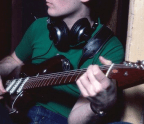
A ROBERT FRIPP interview has become a rare thing. “That Awful Man,” as he calls himself, has been quite happy to keep journalists at arm’s length. He hasn’t even allowed his guitar collection to be photographed. That includes the 1959 Gibson Les Paul Custom, serial number 9 1986, used on many classic albums by his group King Crimson.
Which is why it strikes us as implausible that we are here at Fripp HQ in the Middle England countryside for a lengthy discussion with Fripp on all things King Crimson, as well as a photoshoot of the instruments behind some of that group’s — and prog rock’s — finest moments.
“I don’t collect guitars,” Fripp cautions as we settle down to talk. “They are merely tools that I use in my work.” However, we note that the ’59 Les Paul Custom appears to be in almost pristine condition. In fact, it’s still shiny even after years on the road. “One careful owner,” he quips with a wry grin.
When it comes to Fripp, where does one begin? Certainly, there is the long, rich history of King Crimson, a group whose evolution over the years has been the result of what seem to be rigorously considered changes on Fripp’s part. There are his own skills as a guitarist, including his use of crosspicking to play some challenging classical pieces with a plectrum, instead of the more conventional fingerstyle crosspicking. For evidence of his crosspicking finesse, one need only listen to the Moto Perpetuo from “Fracture,” on 1974’s Starless and Bible Black. This influence reached into the Crimson repertoire and is apparent in “Peace — A Theme” from 1970’s In the Wake of Poseidon.
“Yes, Carcassi Etude No. 7, the middle section,” Fripp confirms. “You probably wouldn’t be able to see the connection, but ‘Peace – A Theme’ wouldn’t have quite ended up that way unless I practiced the Carcassi Etudes for fingerstyle — but with a pick, because crosspicking was my speciality.”
Fripp first arrived on the English rock and roll music scene in the mid 1960s with the League of Gentleman, an act that bears the same name as his 1980 touring group. In 1967, he joined brothers Peter and Michael Giles in Giles, Giles and Fripp, a trio that, in 1968, transformed into King Crimson, Fripp’s long-running, oft-transforming prog-rock group.
As of 2022, Crimson have entered another hiatus. The performance of “Starless” in Japan from last December is regarded by all as the last we’ll hear from the band. But Fripp is anything but idle. He’s just released Robert Fripp/Exposures, a truly massive 32-disc boxset of his late-1970s solo work. This fall will bring the release of The Guitar Circle, his long-awaited book that collects much of his writing about Guitar Craft, his unique approach to guitar playing, collaborating and personal development. Amid this activity, Fripp has generously carved out some time to speak with us. And where does one start with King Crimson’s only permanent member but at the very beginning.
“I DIDN’T HEAR SEPARATE CATEGORIES; I HEARD MUSIC BUT AS IF IT WAS ONE MUSICIAN SPEAKING IN A VARIETY OF DIALECTS”
When you started playing guitar, you were listening to a lot of jazz, weren’t you?
My trajectory was, on my 11th birthday — so that would be 1957 — my sister and I went out and bought






